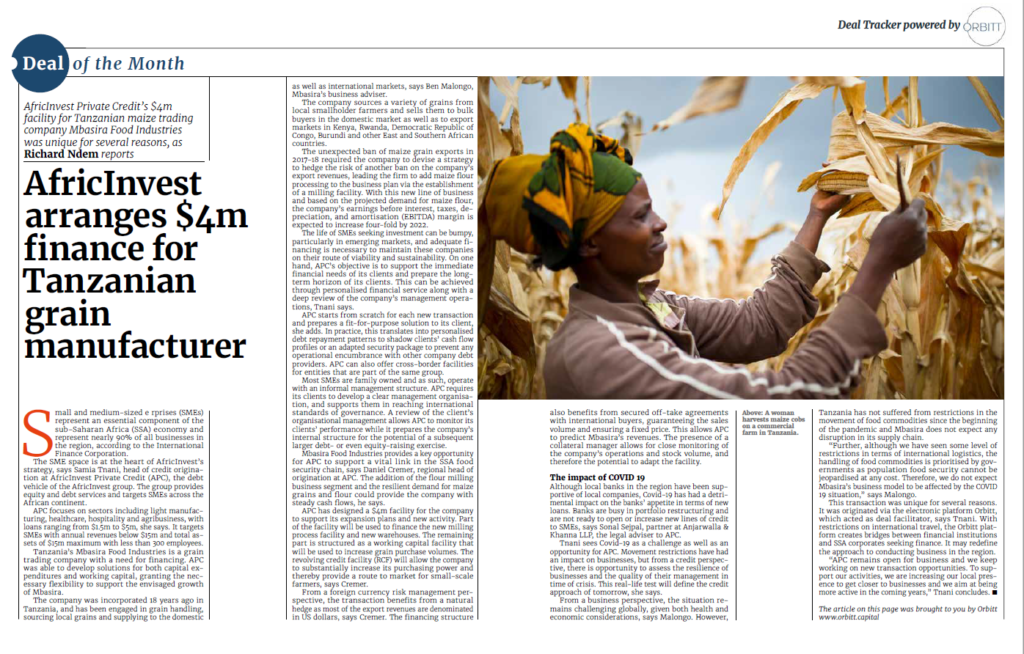 In association with African Business Magazine, market leaders in providing country supplements, industry reports and market intelligence on Africa.
In association with African Business Magazine, market leaders in providing country supplements, industry reports and market intelligence on Africa.
Find out more +
Small and medium-sized enterprises (SMEs) represent an essential component of the sub-Saharan Africa (SSA) economy and represent nearly 90% of all businesses in the region, according to the International Finance Corporation.
The SME space is at the heart of AfricInvest’s strategy, says Samia Tnani, head of credit origination at AfricInvest Private Credit (APC), the debt vehicle of the AfricInvest group. The group provides equity and debt services and targets SMEs across the African continent. APC focuses on sectors including light manufacturing, healthcare, hospitality and agribusiness, with loans ranging from $1.5m to $5m, she says. It targets SMEs with annual revenues below $15m and total assets of $15m maximum with less than 300 employees. Tanzania’s Mbasira Food Industries is a grain trading company with a need for financing. APC was able to develop solutions for both capital expenditures and working capital, granting the necessary flexibility to support the envisaged growth of Mbasira.
The company was incorporated 18 years ago in Tanzania, and has been engaged in grain handling, sourcing local grains and supplying to the domestic as well as international markets, says Ben Malongo, Mbasira’s business adviser. The company sources a variety of grains from local smallholder farmers and sells them to bulk buyers in the domestic market as well as to export markets in Kenya, Rwanda, Democratic Republic of Congo, Burundi and other East and Southern African countries.
The unexpected ban of maize grain exports in 2017-18 required the company to devise a strategy to hedge the risk of another ban on the company’s export revenues, leading the firm to add maize flour processing to the business plan via the establishment of a milling facility. With this new line of business and based on the projected demand for maize flour, the company’s earnings before interest, taxes, depreciation, and amortisation (EBITDA) margin is expected to increase four-fold by 2022. The life of SMEs seeking investment can be bumpy, particularly in emerging markets, and adequate financing is necessary to maintain these companies on their route of viability and sustainability.
On one hand, APC’s objective is to support the immediate financial needs of its clients and prepare the longterm horizon of its clients. This can be achieved through personalised financial service along with a deep review of the company’s management operations, Tnani says.
APC starts from scratch for each new transaction and prepares a fit-for-purpose solution to its client, she adds. In practice, this translates into personalized debt repayment patterns to shadow clients’ cash flow profiles or an adapted security package to prevent any operational encumbrance with other company debt providers. APC can also offer cross-border facilities for entities that are part of the same group. Most SMEs are family owned and as such, operate with an informal management structure.
APC requires its clients to develop a clear management organisation, and supports them in reaching international standards of governance. A review of the client’s organisational management allows APC to monitor its clients’ performance while it prepares the company’s internal structure for the potential of a subsequent larger debt- or even equity-raising exercise. Mbasira Food Industries provides a key opportunity for APC to support a vital link in the SSA food security chain, says Daniel Cremer, regional head of origination at APC. The addition of the flour milling business segment and the resilient demand for maize grains and flour could provide the company with steady cash flows, he says. APC has designed a $4m facility for the company to support its expansion plans and new activity. Part of the facility will be used to finance the new milling process facility and new warehouses. The remaining part is structured as a working capital facility that will be used to increase grain purchase volumes. The revolving credit facility (RCF) will allow the company to substantially increase its purchasing power and thereby provide a route to market for small-scale farmers, says Cremer. From a foreign currency risk management perspective, the transaction benefits from a natural hedge as most of the export revenues are denominated in US dollars, says Cremer.
From a foreign currency risk management perspective, the transaction benefits from a natural hedge as most of the export revenues are denominated in US dollars, says Cremer. The financing structure also benefits from secured off-take agreements with international buyers, guaranteeing the sales volume and ensuring a fixed price. This allows APC to predict Mbasira’s revenues. The presence of a collateral manager allows for close monitoring of the company’s operations and stock volume, and therefore the potential to adapt the facility.
The impact of COVID 19
Although local banks in the region have been supportive of local companies, Covid-19 has had a detrimental impact on the banks’ appetite in terms of new loans. Banks are busy in portfolio restructuring and are not ready to open or increase new lines of credit to SMEs, says Sonal Sejpal, partner at Anjarwalla & Khanna LLP, the legal adviser to APC. Tnani sees Covid-19 as a challenge as well as an opportunity for APC. Movement restrictions have had an impact on businesses, but from a credit perspective, there is opportunity to assess the resilience of businesses and the quality of their management in time of crisis. This real-life test will define the credit approach of tomorrow, she says.
From a business perspective, the situation remains challenging globally, given both health and economic considerations, says Malongo.
However, Tanzania has not suffered from restrictions in the movement of food commodities since the beginning of the pandemic and Mbasira does not expect any disruption in its supply chain. “Further, although we have seen some level of restrictions in terms of international logistics, the handling of food commodities is prioritised by governments as population food security cannot be jeopardised at any cost. Therefore, we do not expect Mbasira’s business model to be affected by the COVID 19 situation,” says Malongo.
This transaction was unique for several reasons. It was originated via the electronic platform Orbitt, which acted as deal facilitator, says Tnani. With restrictions on international travel, the Orbitt platform creates bridges between financial institutions and SSA corporates seeking finance. It may redefine the approach to conducting business in the region. “APC remains open for business and we keep working on new transaction opportunities. To support our activities, we are increasing our local presence to get closer to businesses and we aim at being more active in the coming years,” Tnani concludes.
Read this Deal of the month, including Deal tracker and more via African Business Magazine



